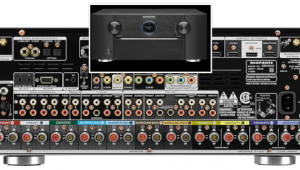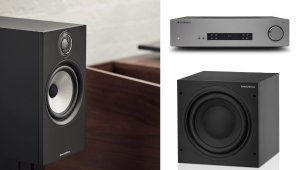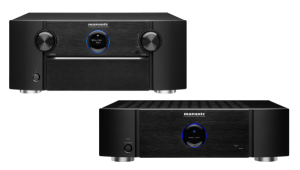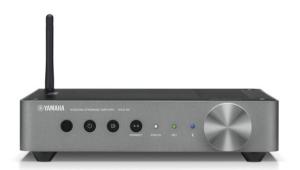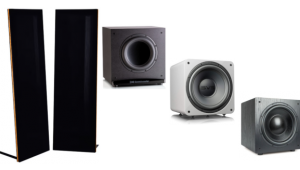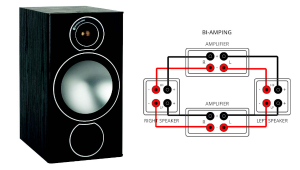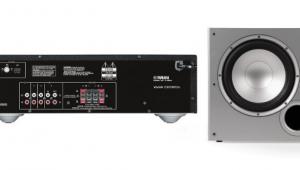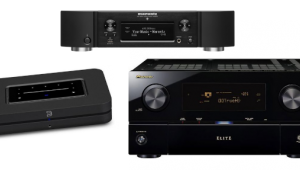The Difference Between Dolby Digital and THX

I am using an Integra DTR-7.9 A/V receiver with Anthony Gallo A'Diva Ti speakers for the front left, right, and center, three Gallo Micro Nucleus Ti speakers for the surrounds, and a Gallo MPS-150 sub modified by Gallo with its upgraded TR-3 driver for a 6.1 setup. My receiver automatically switches to Dolby Digital EX or THX Surround EX (whichever I choose) when I play 5.1 or better content, but which one should I have it switch to?
Where THX is concerned, I know that all speakers should have a frequency response down to at least 80Hz, which only three of mine do—the A'Diva Ti speakers (the Nucleus Micro Ti speakers only go down to 90Hz). I fear you may tell me to just set it to whichever sounds better, but a guy like me needs more than that. With my setup, what would you do? I like the brightness of Dolby Digital, but I also like the punch of THX, though the highs seem muddled because of Re-EQ (which I can turn off). Should I turn on Loudness Plus and ditch Dynamic EQ? Lots of questions, too many settings, I need guidance!
"Help me Obi-Scott Kenobi, you're my only hope."
Adam Meyerson
I am honored that you think of me as a home-theater Jedi! And your question is not primitive at all—in fact, it reveals a common misconception that THX modes are somehow equivalent or similar to Dolby Digital and DTS. They are not the same thing at all. Dolby Digital and DTS are codecs (coder/decoders) that are used by content creators to encode sound so it takes less storage space and bandwidth, and then by A/V receivers and preamp/processors to decode the audio information so it can be played back.
THX modes do not encode or decode audio—instead, they process the sound after it has been decoded by the Dolby Digital, DTS, or any other codec. For example, THX Surround EX in the Integra DTR-7.9 applies Re-Equalization (Re-EQ), Timbre Matching, and Adaptive Decorrelation to the audio decoded by Dolby Digital EX. So you don't choose one or the other—instead, you choose whether or not to apply THX post-processing to the decoded audio. In your case, if you enable THX Surround EX, the AVR applies THX post-processing to the Dolby Digital EX soundtrack; if you choose Dolby Digital EX, the THX post-processing is not applied to the audio.
According to THX, "THX Listening Modes can be used in conjunction with a variety of audio encodings (Dolby Digital, DTS, etc). For instance, THX Cinema Mode does not override material that was encoded with Dolby Digital. However, it does add some settings that help adapt the audio for the home environment.
"Setting your speakers to 'Small (80Hz)' insures that they are passing off the appropriate amount of bass to the subwoofer. If you are not able to do that, for whatever reason, with one or more of your speakers, that's okay. It just means you'll hear a little less bass out of the subwoofer." You won't notice this much at all, since your surrounds go down to almost 80Hz.
You fear that I'll tell you set your AVR to whatever sounds good to you, and I'm afraid I must do just that. If you like the brightness of unprocessed Dolby Digital and the punch of THX Surround EX processing but the highs sound muddled, enable THX Surround EX and turn off Re-EQ.
You also mention Loudness Plus, which is a THX function, and Dynamic EQ, which is part of the DTR-7.9's Audyssey processing. Both do much the same thing—they adjust the frequency response when listening at volumes lower than so-called "reference level" to maintain the soundtrack's intended tonal balance. (Reference level is loud, so I certainly listen at volumes lower than that.) I wouldn't expect to hear much difference between the two, but I recommend trying them both (not at the same time!) to see if you have a preference. Also, try listening at your normal volume without either one. If you do find one to sound better than the other, use that one and disable the other one; if you prefer the sound without them, so be it.
May the A/V Force be with you!
If you have an A/V question, please send it to askhometheater@gmail.com.
- Log in or register to post comments
